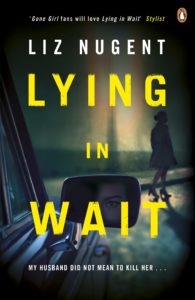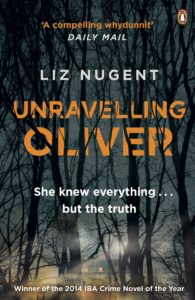Books
Liz Nugent: writing Lydia
My first novel, Unravelling Oliver, was about a sociopathic man, told mostly from his point of view. When I embarked on Lying in Wait, I wrote the entire first draft as a single person narrative and it was Laurence, the overweight schoolboy, who was my protagonist.
My editor suggested that his mother, Lydia, was a far more interesting character, so I began to explore her thought processes. Pretty soon the character came to life and she revealed herself to me as someone who could easily lie and manipulate everyone around her. My editor was right. She was fascinating. After I had finished, I began to think about the damaged women we know from literature. Four names came to mind straight away, but when I analysed them, I realised how heavily they must have influenced me.
 The first character that sprang to mind was Lady Macbeth. Her ruthless ambition is ultimately her undoing. Macbeth is my favourite of all Shakespeare’s plays and Lady M is the most compelling of characters. Her husband is slightly in awe of her and he will do what she wants in order to satisfy her. She has the power in the relationship. Similarly, in Lying in Wait, Lydia forces her husband to desperate measures to satisfy her ambition.
The first character that sprang to mind was Lady Macbeth. Her ruthless ambition is ultimately her undoing. Macbeth is my favourite of all Shakespeare’s plays and Lady M is the most compelling of characters. Her husband is slightly in awe of her and he will do what she wants in order to satisfy her. She has the power in the relationship. Similarly, in Lying in Wait, Lydia forces her husband to desperate measures to satisfy her ambition.
Then there is Dickens’ Miss Havisham in Great Expectations. Her life stopped on her wedding day when her husband-to-be betrayed her as she put on her wedding gown. She has never been able to move on from the shock. Decades later, she still wears the wedding dress and sits among the decayed ruins of her wedding breakfast. Lydia too is in some ways trapped in the mind of her nine-year-old self, unable to move on from the childhood incident that has traumatised her life, unable even to speak of it.
Mrs Danvers in Daphne Du Maurier’s Rebecca does everything she can to protect the memory of the first Mrs De Winter and she refuses to allow Max’s new wife to replace his dead one. Lydia worshipped her father and she has done her best to make her husband match up. She loves her husband but only when he behaves like her late father. Her gracious home is her father’s legacy and she feels utterly lost when forced to leave it. Her agoraphobia is related to her banishment as a child. Like Mrs Danvers, she is protecting a dead memory.
All of the above characters play supporting roles in the stories in which they feature, but Medea is at the centre of her own story in Euripides’ Greek tragedy. Hell hath no fury like a woman scorned and Medea’s revenge was the most treacherous of all. Class comes in to play here too. Medea is told by her husband that he needs to marry someone of better status but will keep her as a mistress. She commits the most heinous of murders- and gets away with it.
 In Lying in Wait, when Lydia perceives herself to be betrayed, she plans to take the most cruel revenge – and I can’t say any more without ruining the plot!
In Lying in Wait, when Lydia perceives herself to be betrayed, she plans to take the most cruel revenge – and I can’t say any more without ruining the plot!
As with Unravelling Oliver, I really had to put myself in the mind-set of Lydia while I was writing her story in Lying in Wait. How would someone like Lydia think? Would she try to resolve her issues or is she so used to keeping up middle class appearances that she would ignore them? If she got psychiatric assistance, would it make a difference or would she feel superior to the psychiatrist? If you hide a part of your history for your whole life, would it warp a part of your personality?
I had a good training for this kind of forensic work when I worked on a TV soap opera. Part of my work was to provide a detailed character continuity document, which provided info for all new directors and writers and kept them up to speed with all of the characters and their attitudes to each other.
I also did some actor training many years ago and I think that might have helped too, as regards taking on a new persona and thinking like that character.
Lydia is far worse than Oliver. She has no remorse and very little guilt about her actions. It was liberating for me to write such a narcissist. I looked back at my notes today to see what I had written about how Lydia would spend her spare time (and she has a lot of it). I wrote ‘exercise, exfoliation, hair styling, body cream, skin care, make up, self improvement (surface only)’. That sums her up!
Don’t miss our review of Lying in Wait here.
2 Comments
Join the discussion
Please note: Moderation is enabled and may delay your comment being posted. There is no need to resubmit your comment. By posting a comment you are agreeing to the website Terms of Use.



Another New author for me to look for. I especially like this sort of book which gets under the skin of a character.
Have just finished reading Lying in Wait. I really enjoyed it. Especially the ending.